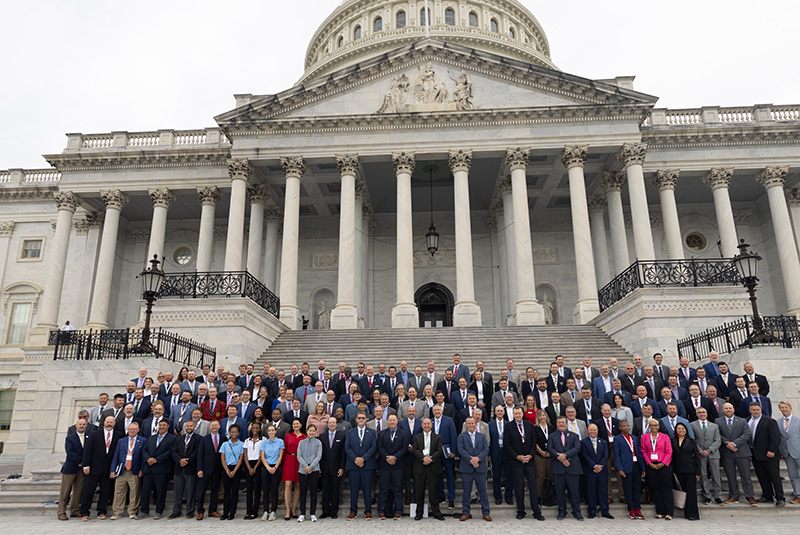
As we approach the end of another year, it’s the perfect time to reflect on how the GCSAA government affairs team has been working on issues that have a direct impact on the health and well-being of golf facilities.
GCSAA’s advocacy work is guided by the association’s Priority Issues Agenda, which outlines key focus areas — value of golf, water, pesticides, fertilizers, labor and workforce development, and power equipment. The PIA is created by the Government Affairs Committee and approved by the GCSAA Board of Directors.
During 2024, staff members were focused on ensuring superintendents continue to have chemical tools in the toolbox. For example, the U.S. EPA has proposed significant changes to the chlorothalonil label and expects to finalize a decision by year-end. A proposed cancellation of PCNB and acephate is also pending. Other chemistries, like thiophanate-methyl and iprodione, have proposed label changes. Staff members work with industry partners, members and turfgrass scientists to provide information to the agency on real-world use of products to ensure evaluations are scientifically sound.
The staff is also working with the EPA as it attempts to comply with its Endangered Species Act obligations. GCSAA has weighed in on the ESA Workplan and many strategies and pilots that have the potential to change the way pesticides are used on golf courses.
The U.S. golf industry has been disqualified and deemed unworthy of various forms of disaster tax relief and economic stimulus programs that are available to other businesses, such as restaurants, hotels and attractions. We have been working to identify co-sponsors of H.R. 3124, a bill in Congress to remove this discriminatory language from the U.S. tax code. The importance of this bill is magnified by the recent hurricanes Helene and Milton.
2024 saw numerous bills introduced at the state and local levels impacting golf course management. Lawmakers targeted inputs, tools and resources relied on by superintendents to maintain in-play and out-of-play areas at golf courses. Thanks to the work of GCSAA members across the country, chapter contract lobbyists and the GCSAA government affairs team, most harmful bills were defeated, while others gaining golf support were approved.
Connecticut superintendents successfully opposed a bill banning the use of neonicotinoid products used to control numerous destructive turf pests, while in Vermont, a similar bill was amended to allow for turf applications of such products. Similar legislation in Washington state will limit the use of neonic products to only licensed applicators. Finally, regarding pesticide policy, and of particular note in 2024, was the work of Colorado superintendents to help preserve pesticide preemption laws in their state.
In California, the golf industry actively opposed AB 3192, which would have prohibited the use of any nonorganic pesticide and fertilizer product at “major coastal resorts,” including on a resort’s golf course. Thanks to tireless advocacy work by the industry, the bill was amended to accommodate applications when integrated pest management practices are implemented. The bill ultimately failed to pass but will likely return in 2025.
Outdoor power equipment of all types was a target in many states in 2024. At writing, New Jersey lawmakers are considering a bill that would ban the use of both two-stroke and four-stroke blowers used at golf courses. GCSAA is working to mobilize members to oppose this bill unless it is amended to address the needs of commercial operators.
While GCSAA has been working on issues impacting golf at all levels of government, the end of the year also brings into focus national elections in November, or sooner, if you live in a state that allows early voting.
The race for the White House is going to hinge on which candidate wins the majority of the electoral votes across the country — 270 or more. Polls in each state have consistently shown a tight race between Vice President Harris and former President Trump. The race will be fought and won across seven battleground states: Arizona, Georgia, Michigan, Nevada, North Carolina, Pennsylvania and Wisconsin.
Who has control over the House and Senate is also in play. The next president and Congress will have a great impact on what happens at your facility. So be sure to vote and post your picture on social media with “#golfvotes” so golf’s voice continues to be heard.
Chava McKeel is GCSAA’s director of government affairs. Michael Lee is GCSAA’s senior manager of government affairs. Bob Helland is GCSAA’s director of congressional and federal affairs.